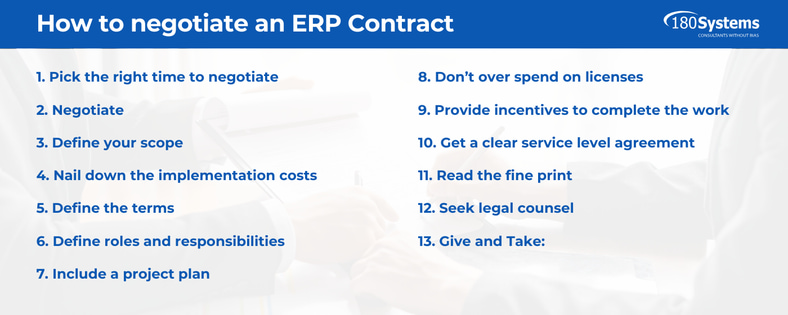An ERP system is a lifetime investment with annual fees in perpetuity. The vendor has standard contracts, which are tough to change, as well as the Statement of Work (SOW), which defines costs, scope, terms, roles & responsibilities… and can be changed:

1. Pick the right time to negotiate
Start reviewing the contract when you are close to making your decision and the remaining vendors are doing everything they can to win your business. Don’t wait until the very end, because by then you will have given up most of your negotiating power. And remember, you’re not just negotiating prices but also all the other fees and terms in the contact. Vendors are often flexible with purchase prices, but less so with implementation fees.
2. Negotiate:
Everything is negotiable right up until you sign the contract. The SOW is not a standard form used by thousands of customers to purchase a small item. You have a right and an obligation to your shareholders or board to obtain favourable terms.
3. Define your scope
Vendors will often provide a statement of work containing general terms such as “consolidation” and call that scope. But scope needs to be defined specifically, or the vendor will keep issuing change orders saying your requests are outside the agreed-upon scope. Ideally, you will have given all the vendors a thorough list of requirements and received written responses detailing how well their systems meet them. Include the winning vendor’s responses right in the contract as part of scope.
4. Nail down the implementation costs
Vendors will want to charge you based on time and materials – and who can blame them when they are making a trip into the unknown? Consider paying them to agree to a certain implementation cost before you sign the contract. Make sure all costs are covered, including training or travel. The goal is to have no surprises that you will need to explain to your boss.
5. Define the terms
The software contract will contain terms such as design documentation, which could mean something very different to you than it does to the vendor. Make sure you understand exactly what you’re getting with your purchase.
6. Define roles and responsibilities

7. Include a project plan
It’s hard to fault vendors for not wanting to commit to a specific project plan and schedule, when some of the tasks they must complete depend on factors beyond their control, such as your staff members’ skill sets or the time they can devote to the project. Nevertheless, you have a right to make sure your vendor meets its obligations on time. As noted in item 4, you could pay the vendor to prepare a schedule before the project is signed based on an understanding of your resources and availability.
8. Don’t over spend on licenses
The vendor might offer a deal for acquiring extra licences upfront, but make sure you can actually make use of them.
9. Provide incentives to complete the work
The contract should include a hold back for a portion of the fees especially for customizations until your system is working as per the contract’s scope. Why pay the full cost until it is working properly?
10. Get a clear service level agreement
A service level agreement should include service commitments by the vendor providing for credits or refunds for missed response/resolution times. There will inevitably be problems but the question is how long it takes to resolve them. Some could be classified as critical in that the entire system is down until they are fixed.
11. Read the fine print
Somewhere in the contract you will find a few sentences that can have a huge impact in future years. Watch out for how much the vendor can increase the license fees in future years, the cost of additional licenses and resource rate increases.
12. Seek legal counsel
The jury is out whether the delay and costs associated with legal advice are worth the benefits. The vendors will engage in legal wrangling for their largest prospects but may not be so willing with smaller customers. As well, there are compelling reasons by vendors to have a happy client who can be used as a reference rather than one who is spreading horror stories.
13. Give and Take
The vendor will become your partner and the contract should allow both you and the vendor to succeed.